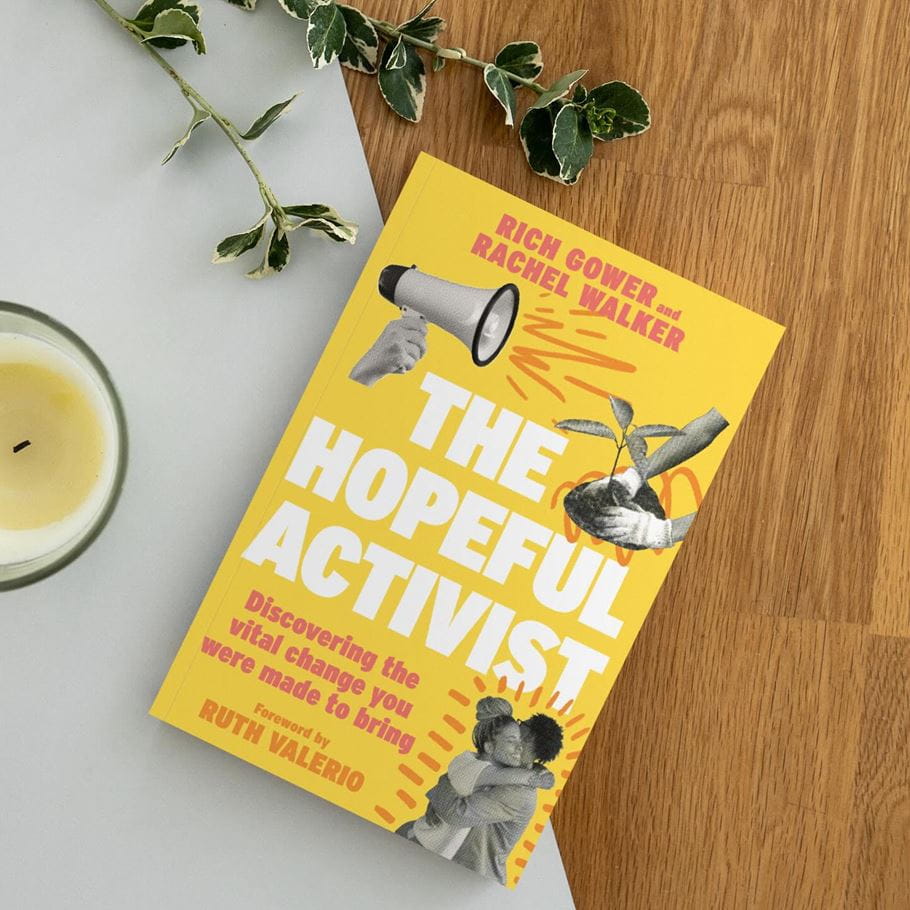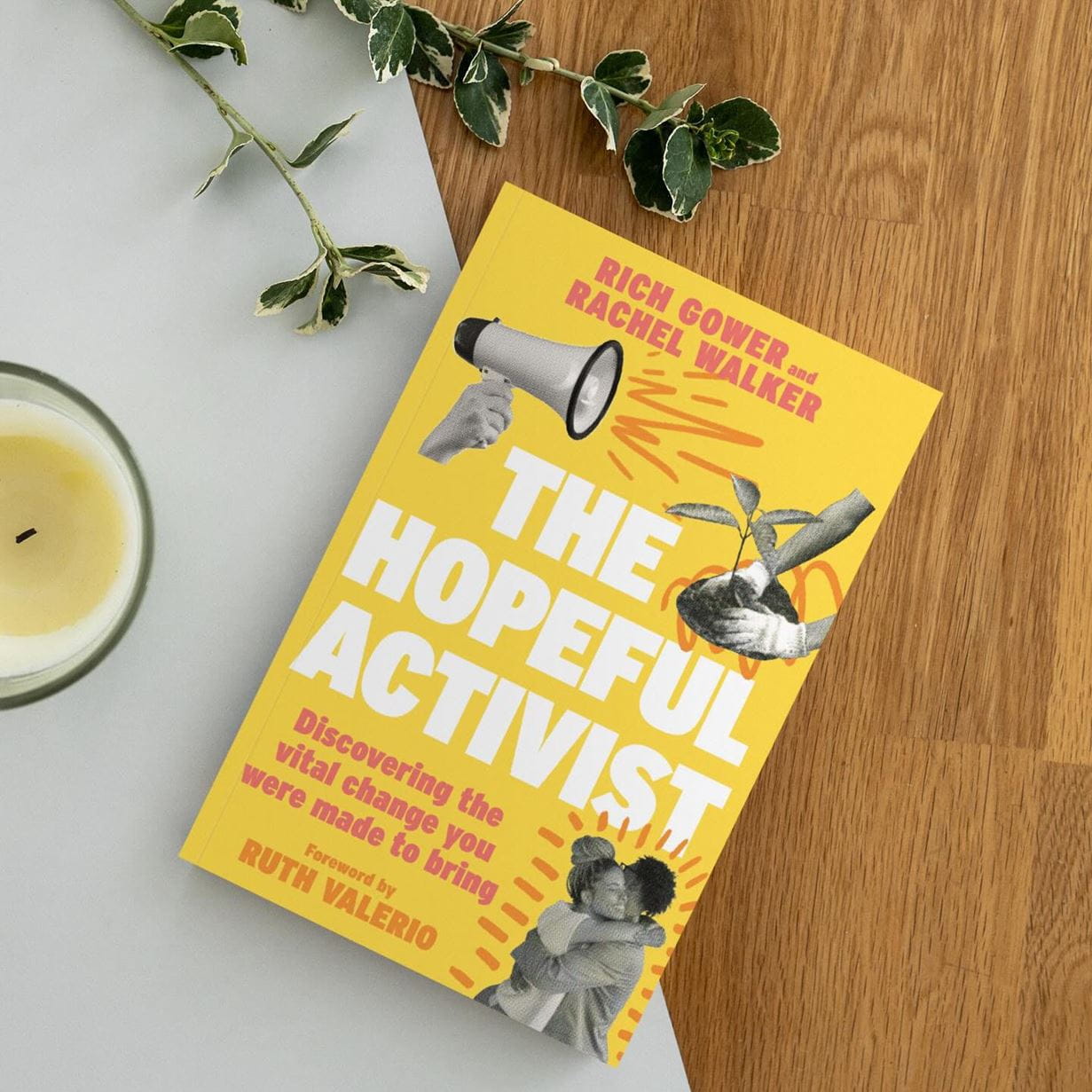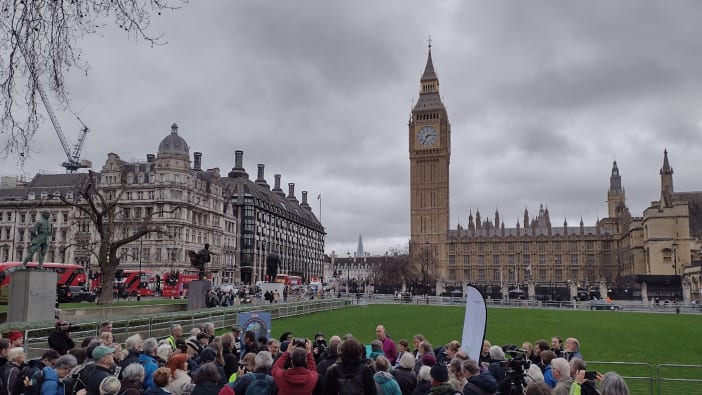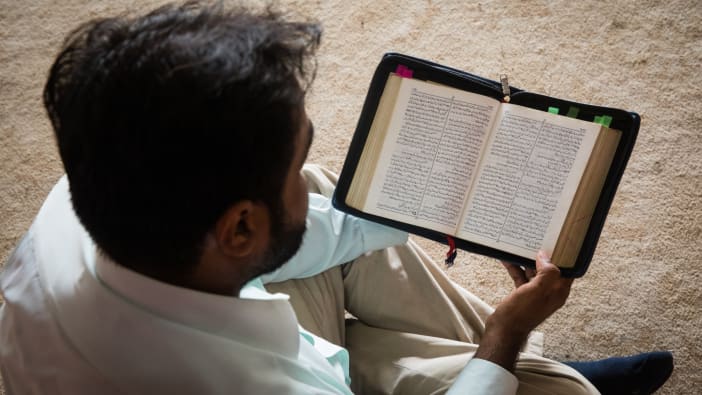How to be a hopeful activist
Author and activist Rich Gower shares practical advice on how to get involved in activism as a Christian.
Interview with Richard Gower | 07 Jun 2024



Rich Gower is a co-author, with Rachel Walker, of The Hopeful Activist: Discovering the vital change you were made to bring. Credit: Richard Gower.
What prompted you to write the book?
We've been running a podcast for five years now, and have interviewed more than 150 Christians involved in justice work. That’s all sorts of different things, from local projects and campaigns to global work with refugees, food banks… basically, all sorts of activism. If you can think of a type of activism, we've probably interviewed someone involved with it.
The idea of the book is that we condense all of the essential learning from that podcast into one handy volume, so that anyone who wants to get more involved in justice work, to find out what their role might be in God's grand story when it comes to justice, or to work out how to do it a bit more effectively or in a way that's healthy for them, can get what they need from the book.
So, one handy volume that does those three things. That's the idea.
Why did you choose the title The Hopeful Activist?
Hope feels like it's something that's perhaps a little bit in short supply in the world at the moment. And it's something that is absolutely crucial. If we want to make a change, we have to have hope. We have to believe that a different world is possible and that we have a role to play in bringing that about. That's what hope is.
As Christian activists, there's something particularly special about hope, and this is that we know the end of the story. We know that at the end of the day, God is going to restore all things. All these broken relationships around us, between us and other people, us and God, us and creation, will be restored. So, we have this eternal hope.
But God also sometimes gives us particular instances of hope for specific things that can change in our time. I think navigating that landscape around hope and the difference between the eternal hope and what hope means right now, is at the core of what it means to be an activist.
Why would you say that activism is important for Christians to be part of?
It's really important that we place all of our activity in the context of the grand story that God's writing. And we have a question that we use to help guide us in that: ‘What can I do today that will last into eternity?’ That's a really helpful question for us to think about.
The book has a whole chapter that looks at, ‘What is the grand story that God's telling?’ And it starts with Shalom. It starts with harmony back in the Garden of Eden between God and people, people and creation, between people and other people. And even within ourselves. There's this harmonious set of relationships. And then we see that get broken. We see Shalom start to pull apart. And the whole of the rest of the story is about God's work to restore that Shalom, that harmony, that peace.
In the Lord's Prayer, we pray, ‘Your kingdom come on earth as it is in heaven.’ Activism is about making that a reality.


The book shares practical tips on how to get involved in activism without burning out. Credit: Richard Gower
What do you hope people will learn from the book?
The first thing is to start thinking about, ‘What's our unique role in this story?’ God has put in each of us a particular, unique reflection of his character, so there's a unique role for each of us to play. We work with a couple of life coaches in the book to identify some questions we can each ask to really get to grips with, ‘What is at my core? What has God put at my core? What's my special part in this story?’
Then, we look at how to run an effective campaign, the five questions every campaigner needs to ask. And we look at how to run an effective local project and how to deal with power – both people in power and also the power that we have. We talk about how to build a team and all the dynamics and the difficulties around that. Also, how to do this without burning out, which is something that's unfortunately common for activists at the moment.
All of the essential things you need to be an effective activist, to identify your role and carry it out healthily are in there.
What about people who have been activists for ages who are struggling to keep going or just finding life a bit relentless?
It’s something we really wrestle with. I was writing the chapter on burnout a few weeks after coming close to burning out myself, which was either ironic or appropriate, depending on how you look at it.
We talked to different activists (like Shane Claiborne) about how we address burnout. We have also used something we borrowed from Krish Kandiah when we spoke to him, called The Transformation Triangle. The Transformation Triangle asks us to think about our worldview (the stories we tell ourselves about who we are and what we should be doing), our practice (how we put our worldview into practice), and our community.
A really simple example here is around boundaries. Brené Brown, the social work researcher, said that in her research the most compassionate people are also the most boundaried. That's a reflection of people having a worldview that says, ‘I can't meet every need. I'll be clear about what my role is. Then I'm going to put boundaries in place to create space so that I've got the energy and I've got enough life-giving things in my life that I'm not constantly feeling like I'm strung out and run out.’
That means that when you see a need that fits with your calling, you have the energy and the resources to meet it and to be really compassionate. And the book talks in detail about how we can work that out in our lives.
What advice would you give to someone who wants to become involved in activism, but doesn't know where to start?
I'd say, first of all, stop. Spend some time praying. Spend some time with God. Go on a retreat. Spend some time creating space to notice what God might have been highlighting to you about yourself and about the needs in the world around us that you're drawn to.
Then, spend some time planning, researching, looking for others that have either done the same thing before or are doing it in your local area or might join with you. And then, thirdly, start. Start moving, start trying. Learn as you go. Often, we're not successful the first time around, but it's a journey, and it's easier to learn when we try.
In what ways do you think individuals can make a meaningful difference and lasting impact in addressing social issues locally and globally?
We all have a key role to play, and if we look back at things like the abolition of the slave trade or civil rights in the US, or free schooling in the UK, we almost take for granted that those things happened. But, to the activists working on them at the time, they were huge, insurmountable challenges, and often they took decades to resolve. But, now they've happened.
As activists today, the challenge is that particularly things like climate change look insurmountable and impossible. But the reality is, if we look back ten years, progress has been made on some of those things.
So, what change can we make? There's three elements to that.
1. We can have a direct impact on the needs that confront us. For example, we can set up a project working with the homeless, free language lessons for refugees in our church, a warm space, or work with the local council to renovate the local park. And we have lots of stories in the book and on the podcast about people who have done that, and how we can achieve that.
2. The second thing we can do is just learn to love more in our own lives. I think this is the essence of what it means to be a Christian: love God and love our neighbours. The Good Samaritan didn't set out to start an amazing project, but he, when he came across someone in need, had the resources within himself to put himself at significant personal risk to help the injured man lying on the road. As activists, that's a big part of what it means. It's about cultivating the ability to love, so that when we come into a situation that needs compassion, we're able to respond.
3. The third thing we can do is just to be faithful. Sometimes we don't see all the results that we desire in our lifetimes. But, part of what it means to be a Christian is to be faithful to the calling that God has given us. To be who we're called to be, even if we don't see the ultimate results in our lifetime. The mission of God is much bigger than any of us.
What's your favourite quote or story from someone that you interviewed either in the podcast or for the book?
I think of all the people we interviewed, the one that I got a bit starstruck by was Shane Claiborne. When I was in my early twenties, I read his book The Irresistible Revolution and it had a really profound impact on me. He came across as someone with integrity who lived the way they were talking about.
He also said a few things that have stayed with me. One of them was, ‘What does it mean if, at the centre of our faith, we have a brown skinned refugee who's born in a stable because there's no room in the inn?’ Everything about Jesus is about identifying with the pain and suffering of the world. It's about leaning into the mess. And that's our calling as activists. I found that really helpful, because I think there's so much chaos at the moment, it's tempting to look the other way. But actually, God's calling us to lean into this. That's what Jesus models. He came into the mess and was born absolutely in the midst of it.
‘In the Lord's Prayer, we pray, "Your kingdom come on earth as it is in heaven". Activism is about making that a reality.’
Another thing Shane said, which goes back to the burnout point, is, ‘How do you put out a campfire? You scatter the coals. But, when the coals are together and wind comes, it actually makes the fire stronger.’ That importance of community and of working with other people and having people that can call us out and say, ‘What's going on? You look like you're struggling. Do you need to take a break?’ Also, it’s about having people to take action with – the importance of building a team. I found that a really helpful analogy.
There's another quote in the book from someone called Howard Thurman. ‘When you're considering what to do with your life, don't ask what the world needs. Ask, “What makes you come alive?” What the world needs is people who are fully alive.’ When I initially heard that, I was tempted to dismiss it as a bit of a self-help kind of quote. When I found out that Howard Thurman was a civil rights activist and pastor and advisor to Martin Luther King, I took it a lot more seriously.
So, I think the idea of finding out what makes us come alive really relates to identifying, ‘What has God put at our core? What's the unique reflection of God that's in each of us?’ And that can be a helpful way of working out what our part is to play in this grand story that God's writing.
What was the most surprising thing that you learned by putting this book together?
I think the thing that I come back to again and again relates to how we deal with power. This is something that Reverend Dr Sam Wells (the Vicar of St Martin-in-the-Fields) talks about a lot. Maybe the best way to explain it is with an example. Let's say we feel called to set up a project for people who are homeless. There are three ways of going about this.
The first, we could call ‘working for’. So, we are just going to set up the project. It's going to be carrot soup and bread rolls, and it's going to run on a Tuesday at 6pm, and we just organise it and run it at those times. Now that's okay, but the problem is we haven't actually spoken to anyone that might come to the project about what their needs might be. Maybe they don't like carrot soup. Maybe that evening's a bad time. Maybe they don't even need a soup kitchen.
So, another approach we might take is ‘working with’, where we get together with the people who are homeless and say, ‘Let's work together to organise something here, and let's do it collaboratively.’ That's much better.
And then there's a third approach, which is called ‘being with’, and this, Sam would say (and I agree), is actually what the Kingdom of God is all about. This is the restoration of relationships. It's about being with God, being with each other and being with creation. And if we say, ‘Okay, the ultimate aim of our activism is the restoration of relationships, and it's about being with’, then we don't want to be in the kitchen preparing the soup and then serving it to other people. We want to have space for everyone to eat together. We want the core of this to be those genuine relationships around the meal table. And that's the best way of doing a project like that and handling power – with the restoration of relationship at the core.
The beautiful thing about that approach is when those relationships start to be restored, we find all sorts of other fruit coming out of it. So, we might find that the reason this person is homeless is because they faced a particular challenge with a government agency or they haven't got a particular bit of paperwork, and actually it’s something that we can help them solve.
Or, it might be that they have a particular passion to meet another need. Maybe they're a musician and they're passionate about using that skill in hospitals to support people there, and we can enable that to take place.
As soon as we start to focus on restoration of relationships, it opens up a whole world where we realise everyone has something to bring and we share that together. We are part of releasing all of us to play more of a role in God's grand story. That insight, the difference between working for and then working with and being with is something that has changed how I think about activism.
Rich Gower is a co-author, with Rachel Walker, of The Hopeful Activist: Discovering the vital change you were made to bring, published by SPCK. He launched the Hopeful Activists' Podcast in 2019 with Abi Thomas, Rachel Walker and Beth Saunders, and until recently, he also co-led Tearfund's global advocacy work on plastics and waste.
Interview with
Interview with Richard Gower
Share this page
Share this page to spread the word and help support those in need.

Get our email updates
Learn about our work and stay in touch with Tearfund. Hear about our news, activities and appeals by email.
Sign up now - Get our email updates






